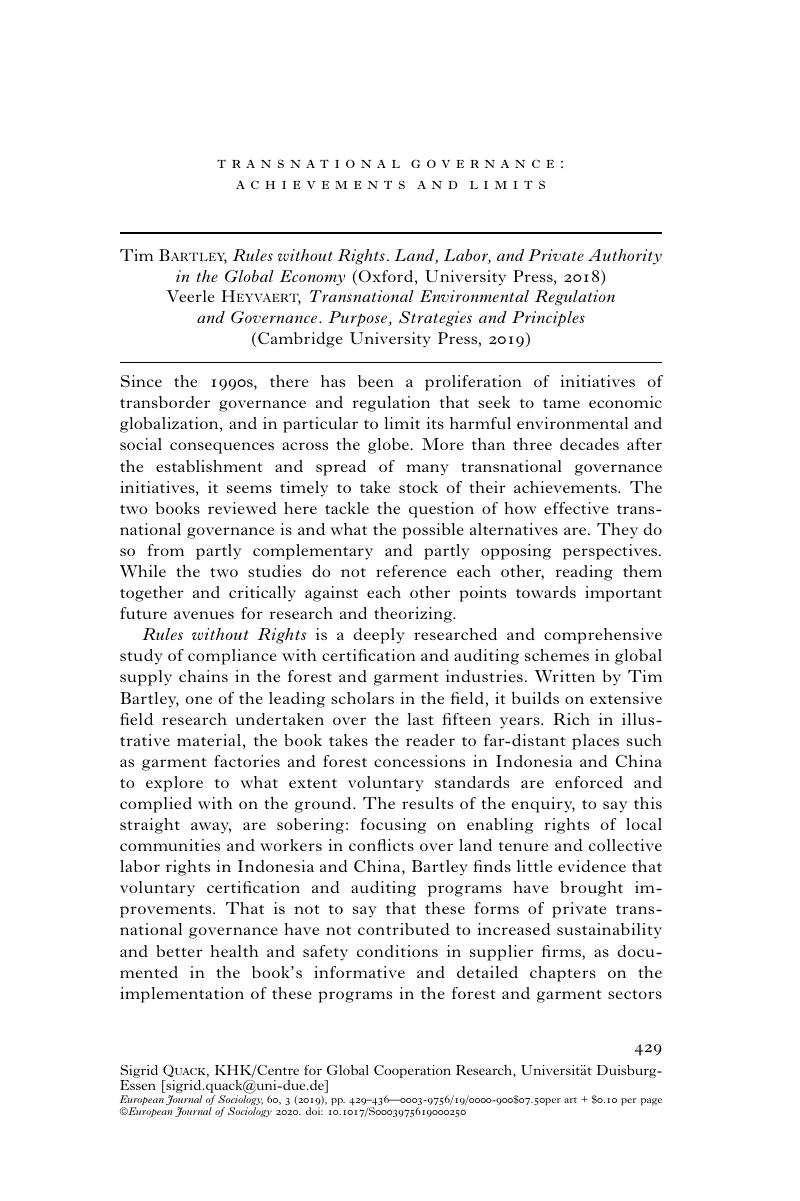No CrossRef data available.
Article contents
Transnational Governance: Achievements and Limits - Tim Bartley, Rules without Rights. Land, Labor, and Private Authority in the Global Economy (Oxford, University Press, 2018) - Veerle Heyvaert, Transnational Environmental Regulation and Governance. Purpose, Strategies and Principles (Cambridge University Press, 2019)
Published online by Cambridge University Press: 14 February 2020
Abstract

- Type
- Book Reviews
- Information
- European Journal of Sociology / Archives Européennes de Sociologie , Volume 60 , Issue 3 , December 2019 , pp. 429 - 436
- Copyright
- Copyright © A.E.S. 2020
References
1 For labor, see also R. M. Locke, 2013, The Promise and Limits of Private Power: Promoting Labor Standards in a Global Economy (Cambridge, Cambridge University Press).
2 For FSC standards, see E. Meidinger, 2007, “Beyond Westphalia: Competitive Legalization in Emerging Transnational Regulatory Systems”, in C. Brütsch and D. Lehmkuhl, eds., Law and Legalization in Transnational Relations (London, Routledge: 133-155). The public endorsement of private standards is also to be found in financial regulation. See S. Botzem, 2012, The Politics of Accounting Regulation: Organizing Transnational Standard Setting in Financial Reporting (Cheltenham, Edward Elgar Publishing).
3 B. Eberlein, K. W. Abbott, J. Black, E. Meidinger and S. Wood, 2014, “Transnational Business Governance Interactions: Conceptualization and Framework for Analysis,” Regulation & Governance, 8 (1): 1-21; J. F. Green and G. Auld, 2017, “Unbundling the Regime Complex: the Effects of Private Authority,” Transnational Environmental Law, 6 (2): 259-284; S. Zajak, 2017, Transnational Activism, Global Labor Governance, and China (Basingstoke, Palgrave Macmillan).
4 T. C. Halliday and G. Shaffer, ed., 2015, Transnational Legal Orders (Cambridge, Cambridge University Press); O. Malets and S. Quack, 2017, “Varieties of Recursivity in Transnational Governance,” Global Policy, 8 (3): 333-342.
5 For example, C. Parker and V. L. Nielsen identify fourteen factors that influence compliance, the majority of which are not directly linked to coercion or deterrence: C. Parker and V. L. Nielsen, ed., 2011, Explaining compliance: Business responses to regulation (Cheltenham, Edward Elgar). For economic and social factors fostering compliance, see also M. L. Djelic and S. Quack, 2018, “Globalization and Business Regulation,” Annual Review of Sociology, 44: 123-143.


